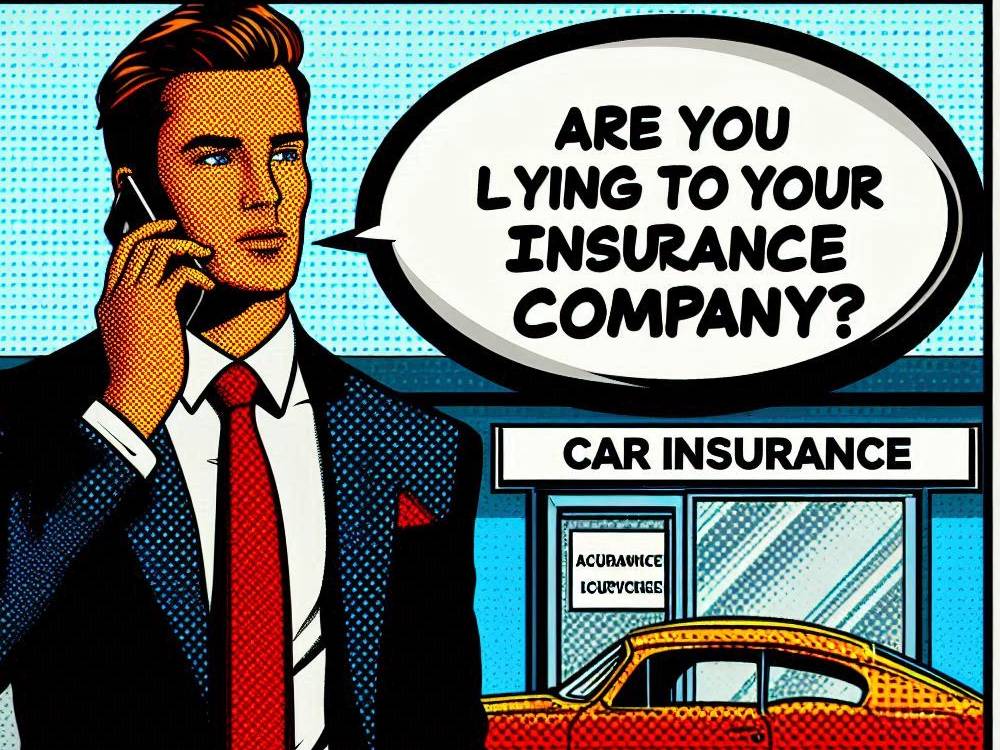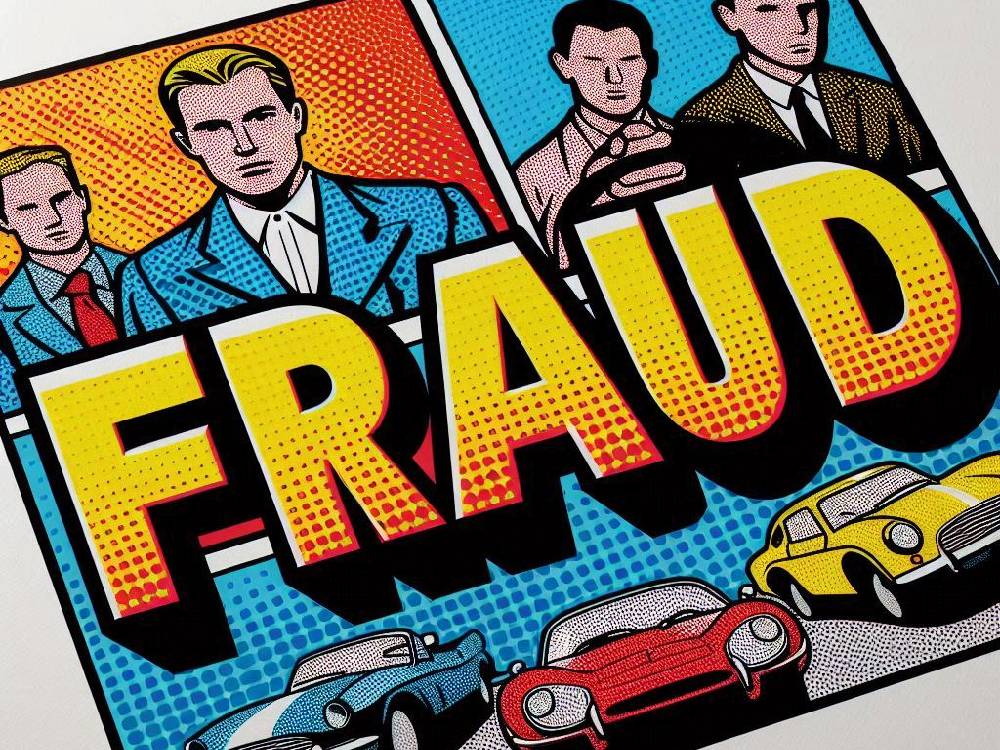Introduction
Thinking of lying to your car insurance company?
When it comes to car insurance, one small lie could wreck your financial future.
It might feel harmless.
Tweak a detail here.
Leave something out there.
All to save a few quid on your premium.
But if you’re tempted to bend the truth on your car insurance application — think again.
Because insurers aren’t just taking your word for it.
They’re verifying your info, your driving record, and more.
What Really Happens When Lying To Your Car Insurance Company?
Let’s be clear:
Lying to your car insurance company isn’t just “fudging the details.”
It’s called non-disclosure, and it’s taken seriously.
Here’s what your insurer can do:
- Cancel your policy without refund
- Refuse to pay out any claim — even unrelated ones
- Reject third-party claims made against you
- Add you to a national fraud register
- Raise your future quotes
- Blacklist you from mainstream insurers
Still think it’s worth the risk?
Let me explain…
You could be in a serious accident, and the insurer might refuse to pay out.
Even if the lie was about your address or mileage — not the crash itself.
And that means you’re left to pay everything out of pocket.
Worse still?
You might be prosecuted for insurance fraud, depending on what you failed to disclose.
It’s a high-stakes gamble.
And the house always wins.
If you want to explore your cover options safely, check out Car Insurance Options.
Lying To Your Car Insurance Company Could Invalidate Car Insurance
Modifications You Didn’t Declare
Adding alloys?
Upgrading the exhaust?
Without a doubt, non-disclosure of changes gives your insurer the right to cancel your policy outright.
Moreover, even cosmetic tweaks can significantly increase your insurance risk — often more than drivers realise.
Insurers assess the performance, appeal, and theft risk of your vehicle — and modifications change all three.
So what’s the smart move?
Always notify your insurer before you make any changes.
Then ask how it’ll affect your premium.
It might cost more — but it’ll save your cover.
Read more in Car Modifications: What Should You Declare?
Wrong Use of Vehicle
Be honest:
Are you using your car for work but claiming it’s for “social use only”?
That’s one of the most common and costly mistakes drivers make.
If you drive to work, carry equipment, or travel for business, you need the correct cover.
Otherwise, your insurer can — and likely will — reject your claim.
Even a regular commute to the train station counts as business use.
The roads during rush hour are high-risk.
And if you’re involved in a crash during that time, expect your insurer to scrutinise your declared usage.
Find out what qualifies under Business Car Insurance.
Who’s Really Driving the Car (aka Fronting)
Here’s the scenario:
Mum buys the insurance.
Her teenage son is listed as an “occasional driver.”
But in reality?
He’s the one driving it every day.
That’s called fronting — and it’s illegal.
You might think it’s a clever way to cut the cost of young driver insurance.
But insurers know the trick.
If they catch you?
They’ll cancel the policy.
Refuse any claims.
And potentially alert the authorities.
Want to learn more about Fronting?
Lying To Your Car Insurance Company About Your Address
Your postcode affects your premium.
Insurers use local data — from theft rates to traffic levels — to assess risk.
And yes, just two streets over could mean a cheaper quote.
But if your actual address isn’t the one on your policy?
That’s a major issue.
If your car is stolen or damaged, your insurer could refuse to pay.
They might claim you misrepresented your risk profile — and they’d be right.
Don’t gamble with your location.
It’s not just a number on a form.
Lying To Your Car Insurance Company About Your Occupation
Think your job title doesn’t matter?
Think again.
Some professions carry higher risks.
Others, much lower.
Say you’re a delivery driver — but you claim to be “admin staff.”
That’s a clear case of misrepresentation.
Insurers might catch it when checking your employment or payment history.
And when they do?
Your policy could be voided — retroactively.
You’d be driving uninsured without even knowing.
Honesty here isn’t optional.
It’s critical.
Lying To Your Car Insurance Company About Speeding Tickets Or Convictions?
Let’s be honest.
Many drivers receive a speeding ticket and assume it won’t matter.
However, that’s where things go wrong.
You don’t typically need to tell your insurer about a speeding fine right away.
But here’s the catch — you must declare it at renewal.
And if you fail to do that?
You’ve just committed non-disclosure.
Even worse, many insurers ask for convictions from the past five years, not just current ones.
So, although your points might be “spent,” the insurer might still want to know.
Therefore, before renewing your car insurance, check the small print.
Review your driving record carefully.
And most importantly — be upfront.
Still unsure? Read Do All Insurers Need to Know Criminal Convictions?
That one omission could void your cover when you need it most.
So, don’t wait until it’s too late.
Can You Be Charged With Insurance Fraud?
Absolutely — and it happens far more than you’d expect.
Once your information crosses into the realm of intentional deception, you’re now facing insurance fraud.
And that’s no slap on the wrist.
For starters, the insurer will add your name to the CUE database, making it much harder to get insured again.
Worse still, you’ll face rejection from mainstream providers — which means higher costs or no cover at all.
But it doesn’t stop there.
As a result of serious dishonesty, you could face an investigation by the Insurance Fraud Bureau.
That leads to a criminal record — one that follows you everywhere.
So instead of risking your reputation, your licence, and your finances, stay honest.
Because a minor premium saving today could end in a court summons tomorrow.
How To Get Cheap Car Insurance The Right Way
Now that we’ve covered what not to do, let’s shift gears.
You can still find very cheap car insurance — without risking your policy or your future.
Here’s how:
- Increase your voluntary excess
- Park your car off-street or in a garage
- Avoid high-risk modifications
- Pay your policy annually to avoid interest
- Reduce your total mileage if possible
- Install a black box (telematics)
- Fit anti-theft devices or dash cams
Best of all, each of these methods stays within the rules — and insurers reward that honesty.
As a result, these small changes enhance your risk profile and unlock cheaper quotes.
So instead of lying, take smart, legal steps to cut costs.
Want more tips? Check out 5 Ways to Save Money on Car Insurance
These strategies won’t just save you money — they’ll protect your cover, too.
What If You’ve Already Lied On Your Policy?
Let’s not sugar-coat it — this is serious.
But if you’ve already made a mistake, there’s still time to act.
To be clear, delay gives your insurer more time to find the truth before you admit it.
Here’s what you need to do right now:
- Contact your insurer directly — don’t wait for them to find out
- Admit the error and provide accurate, updated information
- Request a corrected policy before you make any claims
- Expect a price change, but be grateful it’s not cancellation
By owning up early, you take back control of the situation.
That honesty may save you from a rejected claim or worse — a fraud investigation.
In the end, insurers prefer honesty, even if it’s delayed.
So fix it today — before they uncover it tomorrow.
Conclusion
Now you know the truth.
At first glance, lying on your car insurance policy might seem like a shortcut to savings.
But it’s actually a fast track to cancelled cover, rejected claims, and legal trouble.
Even a small lie — about your job, mileage, or who’s really driving — can wreck your future.
Instead of cutting corners, take the smarter path.
Be honest.
Start comparing now at Cheap Car Insurance UK
Similar Articles You Might Like
If you found this helpful, you’ll want to explore these next:









